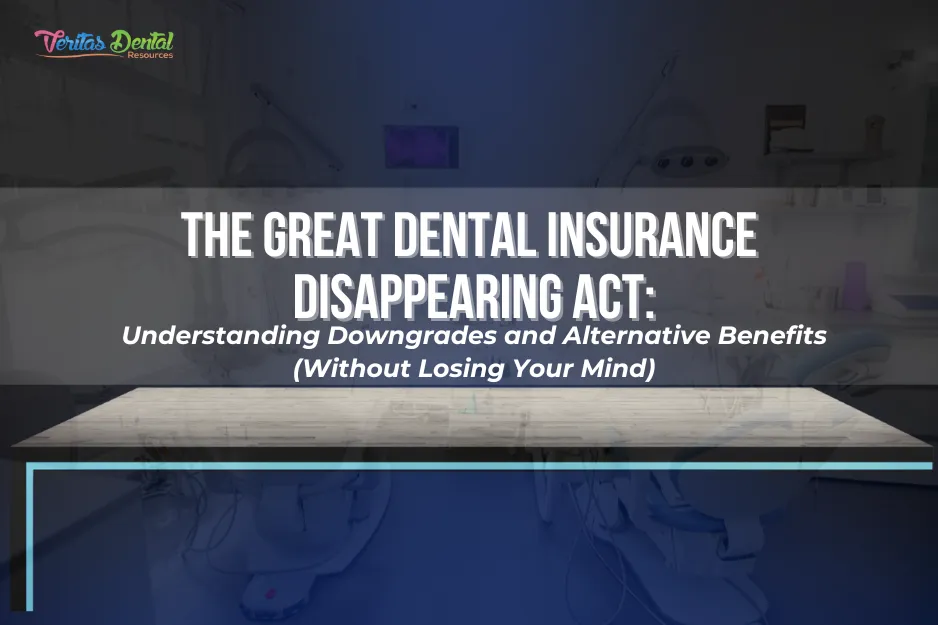
The Great Dental Insurance Disappearing Act: Understanding Downgrades and Alternative Benefits (Without Losing Your Mind)
Imagine this:
You’ve just completed a beautiful posterior composite restoration. The margins are seamless, the occlusion is spot on, and the patient’s thrilled. You proudly submit the claim... and a few weeks later, the insurance company pulls a magic trick: they reimburse you as if you had done an amalgam. 🎩🐇
Welcome to the mysterious world of downgrades and alternative benefits — the Houdini act of dental insurance where what you did disappears and something less expensive reappears in its place.
Let’s dive in (and bring a flashlight).
🧠 What Are Downgrades and Alternative Benefits?
At their core, alternative benefits are a cost-saving tool used by insurance plans. When a dental plan doesn’t want to pay for the procedure actually performed, they offer an alternate benefit — often the cheapest comparable procedure available (translation: less effective, less attractive, or outdated).
Common scenarios:
Posterior composites downgraded to amalgams
Ceramic crowns downgraded to full-metal crowns
Fixed bridges downgraded to partials
Dentures downgraded to economy-grade materials
These are usually justified as “still providing a functional result.” (Because who needs beauty and function, right?)
📜 What Do Most Policies Say?
Most dental plans contain a clause like:
“Benefits will be based on the least expensive, professionally acceptable treatment.”
If that clause is in the plan design, then yes, they can apply a downgrade. If it’s missing? They might be violating the contract — maybe even committing insurance fraud.
⚖️ In-Network? Here's What You Need to Know
If you're in-network, this is where it gets spicy. 🌶️
When a downgrade is applied, the insurance company pays based on the cheaper procedure. But that doesn't mean you have to eat the loss.
You're contractually obligated to write off the difference between your office’s full fee and your contracted fee for the actual procedure — not the downgraded one.
Example:
You placed a composite (D2392), insurance pays based on an amalgam (D2150).
Composite contracted fee = $200
Insurance pays = $130
You can still bill the patient the $70 difference.
Don't write off the full gap. Don’t leave money on the table.
💥 Bottom Line:
The downgrade may affect what insurance pays, but not what you're allowed to collect.
Make sure you:
Document that the upgraded procedure was clinically appropriate
Educate patients early about possible downgrades
Add a clause in your financial agreement about covering the difference
🚨 Fraud Alert: Is the Insurance Company Breaking the Rules?
Sometimes, downgrades are more than annoying — they’re shady.
How to tell:
No downgrade clause in plan, but downgrade applied? Red flag.
Ask for the Summary Plan Description (SPD) — not the EOB, not a verbal explanation.
If they can’t show you the clause in writing, you’ve got ammo.
🧾 Can You Balance Bill the Patient?
Out-of-network? Yes — charge the full fee.
In-network? Only if the plan allows. Check your contract.
Pro tip: Some insurance reps tell you to balance bill even when your contract prohibits it. Don’t fall into that trap.
🧠 Best Practices for Handling Alternative Benefits
1. Verify Like a Boss
Train your team to ask:
Does the plan downgrade posterior composites?
Is there an alternative benefit clause?
Can we get that in writing?
2. Educate Patients Upfront
“We’ll fight it, but insurance may reimburse based on a cheaper option. That’s their decision, not ours.”
3. Write Narratives That Hit Hard
“Tooth #30 restored with posterior composite due to aesthetic concerns and clinical necessity. No downgrade should apply unless stated in the plan.”
4. Appeal When Needed
Send the SPD, attach clinical proof, and push back.
5. Track the Carriers
Keep notes on which companies downgrade the most. You’ll thank yourself later.
🧨 Final Thought: The Biggest Trick of All
Insurance companies know most offices won’t fight back. That’s how they win.
But when you understand how the disappearing act works, you can start flipping the script — and make their profits vanish instead. 💥
✨ Quick Recap
Downgrades are legal only if supported by the plan
Don’t accept a downgrade without verifying the clause
Educate, document, appeal, and fight smart
For expert help, call Veritas. We don’t play games — we win them
📧 [email protected]
📞 888-808-4513
🌐 www.veritasdentalresources.com
Benjamin Tuinei
Founder - Veritas Dental Resources, LLC
Phone: 888-808-4513
Services:
PPO Fee Negotiators | PPO Fee Negotiating | Insurance Fee Negotiating
Insurance Credentialing | Insurance Verifications
Websites:
www.VeritasDentalResources.com | www.VerusDental.com

